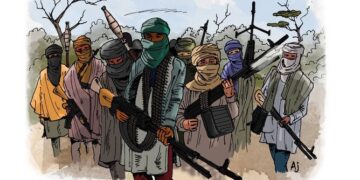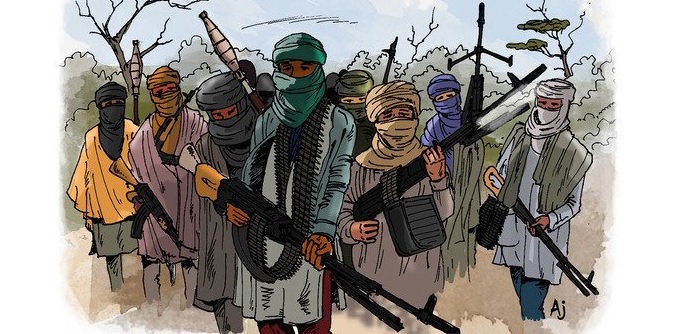By Olusegun Adeniyi
In what must be an act of desperation, the Governor of Katsina State, Dikko Radda, last week promised to support communities that are ready to stand up against attacks by bandits, kidnappers and other criminals. “We have come up with an initiative that for any community ready to depend on itself, we will give them necessary support and training to engage criminals before the arrival of the security agents” Radda said, while explaining what motivated his decision. “I went to a village, Tsamiyar-jino, where it took me two hours inside a Jeep before I reached the village from the main road. So, if bandits attack such areas, from the time you inform the security, it will take them over two hours before they can respond to the distress call. By then, whatever is going to happen would have happened – they would have killed people and kidnapped others.”
It is difficult to fault Radda on this initiative. Katsina State has been under the vice grip of criminals for several years and the picture the governor paints is scary. “I am surprised at the way we are dying in such a humiliating manner. You see five criminals attacking a community of 2,000 to 3,000 people, rape daughters, women and abducting others without any confrontation from the people of that community,” Radda said while lamenting the lawlessness that now pervades the state. “If there are 100 youths in the community who confront them, they will not shoot for more than three times without being captured with bare hands. Paying ransom doesn’t even prevent a hostage from being killed by abductors, sometimes they collect the money and kill the victim.”
Before I come to why the governor’s proposed solution may be counter productive, let me state that I understand how Radda feels. In June 2020, I visited Katsina State, following reports that from Batagarawa to Kurfi to Malunfashi to Funtua and Daura (where then President Muhammadu Buhari hails from), bandits had overpowered communities. Perhaps in a bid to underscore the saying that once you take the shepherd, the sheep will scatter, these criminals had also targeted traditional rulers. Within one week, the Village Head of Mazoji who doubled as the Sarkin Fulanin Fafu, Alhaji Dikko Usman was killed by bandits while the Hakimin Garin Yantumaki, Alhaji Atiku Maidabino was assassinated right in his palace in Danmusa local government.
In the column I wrote following the visit, I recalled asking the Emir of Katsina, Dr Abdulmumini Kabir Usman, his feelings about the situation in his domain. “You are asking me how I feel when my people are being killed every day? We can spend a whole day discussing that. We are dealing with murderers, people for whom lives mean nothing, but they seem to have overwhelmed the capacity of the state”, the emir responded while also recounting his encounter with former Agriculture Minister, Audu Ogbeh and then CBN Governor, Godwin Emefiele who visited his palace and gave him some cotton seedlings. “I asked what they wanted me to do with them. I told them what I needed from the federal government is protection for my people, most of who in any case have been forced to abandon their farms.”
What we are experiencing across the country today is a reign of impunity – with criminals doing whatever they like because they know, or at least believe, that the Nigerian state no longer possesses the required capacity to confront them. Not only have hundreds of innocent villagers lost their lives to the activities of these gunmen, but there is also a feeling of helplessness by the majority of people in rural areas. From cattle rustling to kidnappings and armed robbery, these gangsters roam the streets freely, carrying out deadly raids and forcing dwellers to flee for their lives. In most communities, the local economy has crashed while the poverty and deprivation this has bred are in themselves a serious threat to national security.
The vast land in the North, which should be an asset as we seek to boost food security and get our young population gainfully employed in agriculture, is now ‘bandit territory’ to borrow a famous phrase of Dr Hakeem Baba-Ahmed. Meanwhile, we have overstretched the military with a task of internal security while police personnel are saddled with performing guard duties and running errands for our very-important-persons (VIPs) and their spouses.
Radda is not the first to propose “self-defence” for communities under attack. The last Defence Minister under President Buhari, Bashir Magashi, once said Nigerians should stop being ‘cowards’ at the sight of criminals. “At times, the bandits will only come with about three rounds of ammunition, when they fire shots, everybody runs. In our younger days, we stand to fight any aggression coming for us,” Magashi said at the National Assembly on 17 February 2021 shortly after bandits abducted 27 students and 13 others from Government Secondary School, Kagara, Niger State. “I don’t know why people are running from minor things like that. They should stand and let these people know that even the villagers have the competency and capabilities to defend themselves.”
It should worry authorities that a majority of our people, especially in rural communities, are left at the mercy of non-state actors amid compelling socio-economic difficulties. And asking that they defend themselves is not the way to go because of the reprisal attacks that usually follow. I understand that the recent Boko Haram invasion of Mafa in Tarmuwa Local Government of Yobe State that led to the killing of dozens of innocent villagers was a revenge mission against communities that offered resistance. “Around 150 suspected Boko Haram terrorists armed with rifles and RPGs [rocket-propelled grenades] attacked Mafa ward on more than 50 motorcycles around 1600 hours on Sunday,” said Abdulkarim Dungus, Yobe state police spokesperson who confirmed to AFP that it was a revenge attack “for the killing of two Boko Haram terrorists by vigilantes from the village.”
That has been the pattern either with bandits or insurgents. Meanwhile, the security challenge in Katsina, and indeed the entire North-west, is not different from that of other areas of our country. And it is compounded by the factor of geography (vast forests and a treacherous border) as well as an absence of deterrence for bad behaviour. The enduring solution lies in reforming/repositioning our armed forces and the police in such a manner that would give them the capacity to deal with the challenge. The growing charge by authorities that people should defend themselves therefore offers no enduring solution. If anything, it would only compound the problem in a nation where there are already too many guns in the hands of criminal gangs.
The worrying aspect is that those tasked to protect us seem to be abdicating their responsibility, while promoting this warped idea that civilians can, and should, defend themselves against armed criminals. Following the armed robbery attack at my residence in December 2020, I went to the police station to file the usual routine report. “How many were they?” the all-powerful DPO asked after I had narrated what transpired. “I don’t know how many were outside but only one operated inside our room with a gun.” Before I could explain further that my wife and I had no idea what was happening to our children in the other rooms, she retorted sharply: “And you could not wrestle him to the ground?” She asked the question with so much contempt that I couldn’t tell my wife when I got back home lest she deemed me to be one of those Magashi ‘cowards’.
What those who man the security sector in the country fail to appreciate is that the connecting thread for the variants of violence we are witnessing across Nigeria, as I have consistently argued, is the loss of what Max Weber described as “the legitimate use of physical force” to criminal cartels. And until they muster the requisite capacity and political will to effectively confront those who trouble the peace of our country, there may be no solution to the problem. They should also not deride rural dwellers who would prefer a functioning security from the state than resort to self-help. “It is praiseworthy to be brave and fearless, but sometimes it is better to be a coward”, a fictional character in the late Professor Chinua Achebe’ novel, ‘Arrow of God’ reminded us. “We often stand in the compound of a coward to point at the ruins where a brave man used to live.”
The United Bank for Africa (UBA) Chairman, Tony Elumelu hit the nail on the head regarding the nexus between security and the socio-economic wellbeing of the people on Tuesday. “To protect our people, feed them, attract investment, and foster trade, we must prioritise security,” Elumelu said at the annual conference of the Chartered Institute of Bankers of Nigeria (CIBN). “Insecurity has become a national crisis, which must be dealt with decisively and urgently. Our people deserve to go to their farms unhindered, live peacefully and conduct their lives and businesses without fear; it is the fundamental right of every citizen.”
The fundamental obligation of the state to its citizens is the protection of life and property. When state officials therefore promote the gangster ethos of asking the people to defend themselves as a policy, anarchy is not too far away.
The Maiduguri Disaster
With corpses being exhumed from cemeteries while farmlands, schools and hospitals are submerged, it is troubling that more and more Nigerians are joining the growing population of internally displaced persons (IDPs) in communities across the country. But there can be no bigger tragedy than that of Maiduguri where snakes, crocodiles and other reptiles have escaped from zoos as hundreds of thousands of people count their losses following the flooding that hit the Borno State capital on Tuesday morning. For the already traumatised people to suffer this kind of devastation on top of the socio-economic challenges in the country and their own peculiar security situation is just too much. But was it an unavoidable tragedy?
I understand that there have been signals in recent years that the Alau Dam which was completed in 1986 could give way anytime as it has now happened. But nobody paid attention. That the resulting human tragedies leave both the rich and poor counting the costs is why I marvel about why we seem to move on without finding long-term solution to serious problems. But with more than 200,000, including women and children, already displaced, according to the National Emergency Management Agency (NEMA), there is an urgent need for mass intervention from the federal government as well as the private sector.
We need a serious conversation about our country and how we waste enormous resources. Nigeria, former Nigeria Hydrological Services Agency (NIHSA) Director General, Clement Nze told me last year, has one of the best natural drainage systems in the world due to our topography, land and location within the Niger Basin that traverses nine countries in West and Central Africa. On annual basis, according to Nze, a total volume of over 200 billion cubic metres of fresh water drains into the Atlantic Ocean. This is a huge resource from nature that could be a catalyst for the much-touted diversification into agriculture, help resolve some of our security challenges and aid power generation. But, as we have seen over the years, it could also be a disaster if not properly harnessed.
We will come back to this issue another day. For now, it is important that all stakeholders help the people of Maiduguri to recover from this devastation.
• You can follow me on my X (formerly Twitter) handle, @Olusegunverdict and www.olusegunadeniyi.com

































